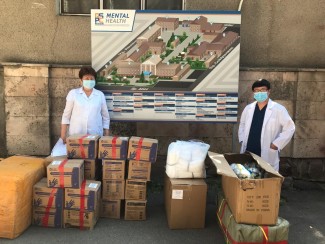UNODC helps mental health workers of Kazakhstan to stay safe during COVID – 19 pandemic

Pandemics and health emergencies like the current COVID-10 outbreak, can cost many lives and pose additional risks to the global economy and overall security and stability. Ensuring continued access to health care during a pandemic, including services for people who use drugs and treatment of drug use disorders, are key not only to protect the health of populations, but also key to security and stability.
Drug use disorders are frequently accompanied by somatic conditions such as HIV/AIDS, hepatitis B and/or C and tuberculosis, lung or cardiovascular disease, stroke, cancer and injuries and traumas among others. Moreover, people with drug use disorders, especially those who inject drugs, may have a compromised immune system. Finally, stigma and discrimination linked to drug use and drug use disorders often result in limited access to basic resources such as housing, employment, health care and social support. For all these reasons, it may be more difficult for people who use drugs and with drug use disorders to protect themselves and they may be particularly at risk of developing COVID-19.
These days Almaty-based Republican Mental Health Centre, one of UNODC’s primary national counterparts in Kazakhstan, and its Pavlodar-based affiliation are at the coronavirus frontline providing emergency medical help to people with the mental health problems and drug use disorders – the most dysfunctional in the epidemiological sense population. Their health conditions most of the time are aggravated with the proneness to vagrancy, failure to comply with quarantine measures, and numerous contacts with people.
On the wake of the pandemic in Kazakhstan in August this year and following the urgent request from the Republican Mental Health Centre, United Nations Office on Drugs and Crime (UNODC) Programme office in the Republic of Kazakhstan, purchased personal protection equipment and bactericidal equipment for the “dirty zone” for the total amount of 12 000 US dollars. Two global UNODC programmes – “UNODC-WHO joint programme on drug dependence treatment and care” and “HIV/AIDS prevention, treatment, care and support for people who use drugs and people in prison settings” – have provided funding for this timely initiative.
”In order to ensure the safety of medical workers who are at the coronavirus frontline now, proving emergency medical help to people with the mental health problems and drug use disorders, and to prevent the spread of COVID-19 in clinical departments, we organized separate, isolation units in the “dirty zone” where newly arrived patients are waiting for the results of their COVID-19 tests”, said Mr. Nikolay Negay, head of the Republican Mental Health Centre.
“We do not stop treatment of people in dirty zones thus reusable anti-plague suits, medical goggles, gloves and masks, shoe covers, and bactericidal irradiators-re-circulators will serve as a good protection to our medical workers”, he highlighted.
As elsewhere, in Kazakhstan the situation has become more complicated with regard to access to harm reduction and drug treatment programmes, and it has become more difficult for people who use drugs to receive health-retention services as the healthcare system is more focused on combating COVID-19. Although respondents of the UNODC ROCA produced report “Brief overview of COVID-19 impact on drug use situation as well as on the operations of the drug treatment services and harm reduction programmes in Central Asia” report reduced overdose cases, it should be predicted that in the shortest term, the use of synthetic drugs, poor quality substances, and mixed substances may lead to serious consequences for the somatic and mental health of PWUD. Consequently, the demand for healthcare services may increase significantly among this population group in Kazakhstan.
Countries reported widespread disruption of many kinds of critical mental health services:
Over 60% reported disruptions to mental health services for vulnerable people, including children and adolescents (72%), older adults (70%), and women requiring antenatal or postnatal services (61%).
67% saw disruptions to counseling and psychotherapy; 65% to critical harm reduction services; and 45% to opioid agonist maintenance treatment for opioid dependence.
More than a third (35%) reported disruptions to emergency interventions, including those for people experiencing prolonged seizures; severe substance use withdrawal syndromes; and delirium, often a sign of a serious underlying medical condition.
30% reported disruptions to access for medications for mental, neurological and substance use disorders.
Around three-quarters reported at least partial disruptions to school and workplace mental health services (78% and 75% respectively).
“The Impact of COVID – 19 on mental, neurological and substance use services: result of a rapid assessment”, WHO, 2020
The support was provided within the framework of Sub-programme 3 - “Drug prevention, treatment and reintegration and HIV prevention” of the UNODC Programme for Central Asia 2015-2020 and UNODC Global Project GLOK32 “UNODC-WHO Joint Programme on drug dependence treatment and care”.